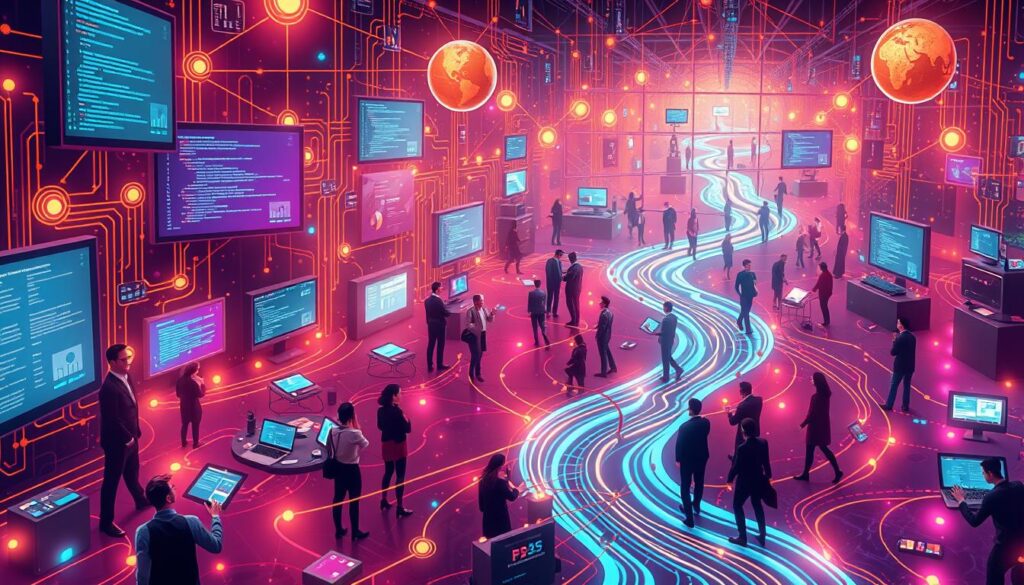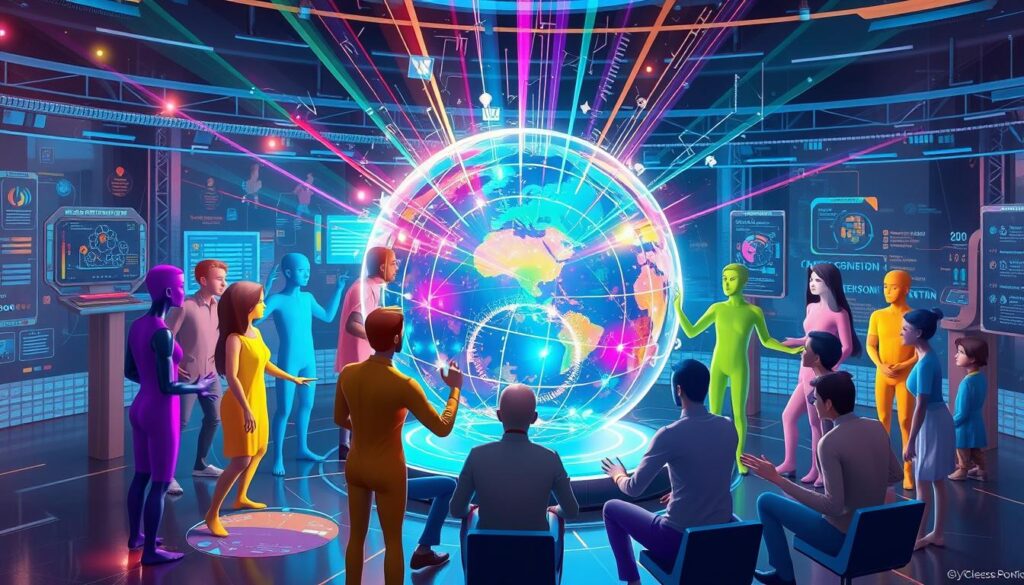The modern job world is changing fast because of new automation and tech. To do well in this changing scene, you need skills that can grow with the job market. This article will show you the key skills for success in an automated world. It will help you make your career future-proof.
Key Takeaways
- Embrace the automated workforce revolution and understand the impact of automation on jobs
- Develop an adaptable mindset to stay ahead of the curve
- Master digital literacy and leverage emerging technologies
- Hone critical thinking skills to tackle complex problems
- Foster collaboration and effective communication in an automated workplace
- Cultivate problem-solving abilities and creativity to remain competitive
- Commit to lifelong learning to anticipate future trends and stay relevant
Embracing the Automated Workforce Revolution
The rise of automation is changing the job market. Machines and algorithms are taking over tasks and roles. This change makes some workers uneasy, but it also offers chances for those ready to learn new skills to thrive in an automated world.
The Impact of Automation on Jobs
Automation is affecting many industries, from making things to serving customers. Upskilling and reskilling are key as some jobs and skills become outdated. Yet, this change also brings new job chances, needing different skills.
Why Upskilling and Reskilling Matter
- Staying relevant in the job market by acquiring in-demand skills
- Adapting to changing job requirements and embracing new technologies
- Increasing job security and career progression opportunities
- Enhancing overall employability and adaptability in the workforce
By embracing the automated workforce revolution and actively upskilling and reskilling, people can set themselves up for success. This mindset is key for moving forward in the job world and doing well in an automated future.
“The future of work is about a person’s ability to adapt, learn, and grow. Those who can keep up with the pace of change will be the ones who succeed.”
Developing an Adaptable Mindset
In today’s fast-changing work world, being adaptable and always learning is crucial. Having a growth mindset and a desire to keep learning helps you stay ahead. It makes you relevant and competitive in the job market.
Being adaptable is key to handling the quick changes brought by technology. Those who can adapt fast, learn new skills, and think creatively will do well in the future. They’ll be ready for whatever comes next.
Continuous learning is at the heart of being adaptable. By always looking for new knowledge and skills, you stay on top. This might mean taking online courses, going to industry events, or getting a mentor.
“The only way to keep up with the pace of change is to constantly learn and reinvent yourself.” – Satya Nadella, CEO of Microsoft
Having a growth mindset means being ready to face new challenges. This could mean taking on a new project, joining a different team, or exploring a new career path. It’s about stepping out of your comfort zone.
By being adaptable and always learning, you set yourself up for success in a changing work world. It’s a path to long-term success.
| Characteristics of an Adaptable Mindset | Strategies for Continuous Learning |
|---|---|
|
|
How to Prepare for the Future of Work: Skills to Thrive in an Automated World
Automation is changing the job market. To succeed, people need to learn new skills. Two important areas are continuous learning and emotional intelligence.
Continuous Learning as a Lifestyle
With technology changing fast, learning new skills is key. People who do well in this new world see learning as a lifelong journey. They look for ways to grow their knowledge, like online courses or job training.
By always learning, workers stay relevant. This not only keeps them employed but also opens up new career paths.
Building Emotional Intelligence
Automation can do many tasks, but human skills are more valuable. Skills like empathy, communication, and problem-solving are crucial. They help workers deal with complex situations and challenges.
Developing emotional intelligence helps people work well with others. It also prepares them for the changing job market. These skills make workers essential in the automated world.
“The jobs of the future will require a combination of technical skills and human skills. Adaptability, creativity, and emotional intelligence will be just as important as coding or data analysis.”
To succeed in an automated world, people need to keep learning and develop emotional intelligence. These skills will help workers adapt and thrive in the future.
Mastering Digital Literacy
In today’s fast-changing digital world, knowing how to use digital tools is key. This skill helps you understand new technologies and use digital platforms to work better together. It makes you more productive and adaptable.
Understanding Emerging Technologies
New tech like AI, machine learning, and automation is changing work. It’s important to know about these changes and how they work. This way, you can use them to your advantage.
Leveraging Digital Tools and Platforms
There are many digital tools and platforms out there. They help make work easier, improve communication, and help teams work together. Learning to use these tools well can make you more efficient and effective, even when working from home.
Being digitally literate is not just an advantage; it’s essential for the future. By using new technologies and digital tools, you can succeed in a world that’s becoming more automated and connected.

Honing Critical Thinking Skills
In today’s fast-changing world, being able to think critically is key. Critical Thinking skills help people deal with new challenges and opportunities. They are essential for success in a world where technology keeps evolving.
Learning critical thinking is complex. It means looking at information objectively, spotting patterns, and making smart choices. These skills are vital for solving problems, coming up with new ideas, and keeping up with technology.
Key Elements of Critical Thinking
- Analytical Reasoning: The ability to break down problems, look at evidence, and come to logical conclusions.
- Evaluating Information: The skill to check if data is trustworthy, accurate, and relevant.
- Creative Problem-Solving: The talent to think differently and find unique solutions.
- Decision-Making: The skill to weigh options, consider different views, and make informed choices.
By improving these critical thinking skills, professionals can handle the changing job market with confidence. They can keep up with new technology and help their companies succeed.
“The essence of the independent mind lies not in what it thinks, but in how it thinks.”
– Christopher Hitchens
Building critical thinking skills takes time and effort. It requires a mindset that grows, a readiness to question assumptions, and a dedication to learning. By doing this, people can get ready for the future of work and do well in an automated world.
Fostering Collaboration and Communication
The workforce is changing fast with more automation. Now, it’s more important than ever to work well together and talk clearly. Learning to work as a team and communicate well helps people solve problems in the automated workplace.
Teamwork in an Automated Workplace
In today’s automated work world, teamwork is key. People need to use their skills and ideas to solve problems. Good collaboration means talking openly, listening well, and sharing ideas. This teamwork helps companies innovate and grow.
Effective Communication Strategies
Good communication is the base of teamwork. In a world where we don’t always meet face-to-face, we need to be good at writing and using digital tools. Using active listening, empathy, and digital tools helps keep everyone on the same page.
| Collaboration Strategies | Communication Strategies |
|---|---|
|
|
Creating a culture of collaboration and communication helps teams succeed. It prepares them to face automation challenges and solve problems. This way, they can shape the future of work together.

Cultivating Problem-Solving Abilities
In today’s automated world, solving complex problems and thinking creatively is key. Developing strong analytical thinking and decision-making skills is crucial. These skills, along with innovation and creative problem-solving, can make you stand out. They prepare you for success in the future of work.
Analytical Thinking and Decision-Making
Analytical thinking lets you break down problems and make informed decisions. This skill is vital in an automated world. It helps you identify and solve issues, weighing the pros and cons of each solution.
Creativity and Innovation
Creativity and innovation are also key in an automated world. Thinking outside the box and coming up with new ideas can give you an edge. By embracing creativity and innovation, you can tackle complex problems and contribute to new technologies.
| Skill | Description | Importance in an Automated World |
|---|---|---|
| Problem-Solving | The ability to identify, analyze, and resolve complex issues effectively. | As automation disrupts traditional job functions, the capacity to solve problems creatively becomes increasingly valuable. |
| Analytical Thinking | The skill of breaking down information, evaluating data, and making informed decisions. | Analytical thinking enables individuals to navigate the complexities of an automated landscape and make well-reasoned choices. |
| Creativity | The capacity to generate novel ideas, think outside the box, and develop innovative solutions. | Creativity is essential for adapting to the changing nature of work and contributing to the development of cutting-edge technologies. |
| Innovation | The ability to introduce new or improved products, services, or processes that create value. | In an automated world, innovative thinking and the implementation of novel solutions can provide a competitive advantage. |
“The future belongs to those who can imagine it, design it, and execute it. It’s not something you await, but rather create.”
Staying Ahead of the Curve
In today’s fast-changing work world, it’s key to stay ahead. By always learning and looking ahead, you keep your skills sharp. This makes you valuable in the job market.
Anticipating Future Trends
It’s important to watch for new tech, industry changes, and what customers want. By keeping up with the latest, you spot chances and get ready for what’s next.
Embracing Lifelong Learning
Learning never stops in a world that’s always changing. Those who keep learning and growing are ready for anything. A growth mindset helps you stay on top of your game.

